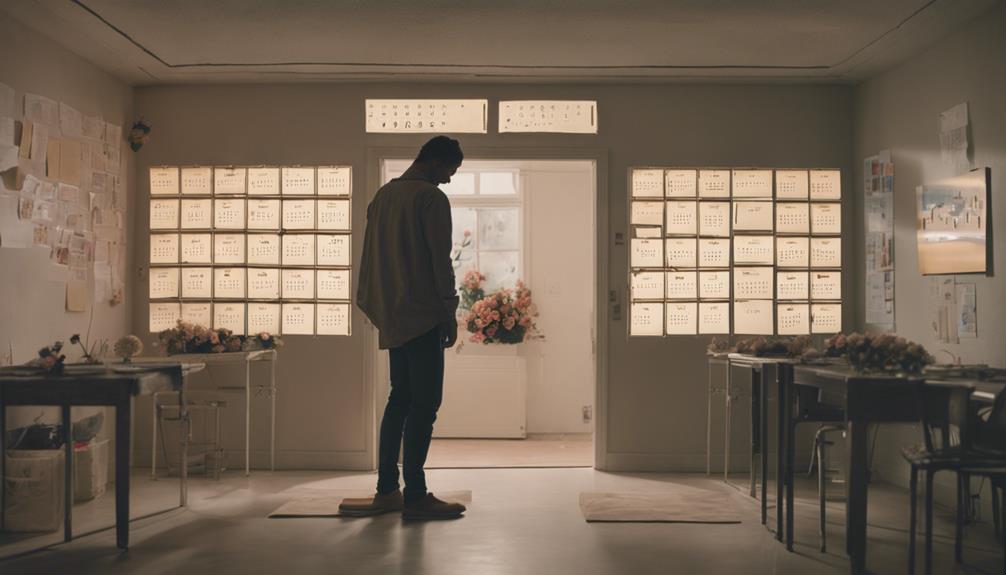Establishing a relationship expecting regular physical interactions, only to find yourself going weeks or even months without seeing your partner, can lead to feelings of emotional distance and insecurity. Not seeing your partner regularly can be a significant relationship strain, potentially causing doubts about commitment and eroding emotional intimacy. While it's not an automatic deal breaker, it can lead to feelings of disconnection and resentment. To overcome this, it's crucial to reassess priorities, expectations, and communicate openly about your needs. Discover how to maintain a healthy relationship despite the challenges of physical distance.
Key Takeaways
- Not seeing your partner regularly can lead to feelings of emotional distance, insecurity, and distrust, putting the relationship at risk.
- Regular physical presence is crucial for building intimacy, trust, and emotional connection, making it a vital aspect of a healthy relationship.
- Lack of in-person interactions can cause misunderstandings, resentment, and frustration, ultimately leading to communication breakdowns and trust issues.
- Prioritizing reciprocal visits and regular meetups is essential to maintain a strong emotional bond and prevent feelings of disconnection.
- If not seeing your partner regularly is a non-negotiable, it may be a deal breaker, and reevaluating priorities and expectations is necessary to determine the relationship's future.
The Importance of Physical Presence
When you're not seeing your partner at least twice a month, the connection you've worked so hard to build starts to fray, and the relationship begins to suffer. Physical presence is important in maintaining a healthy relationship.
While technology like Skype, texting, and calls can help, they can't fully substitute physical dates. Saturday nights are universally recognized as prime date nights for couples, and not making time for these regular meetups can be detrimental.
Exceptions like military deployment, studying abroad, or business trips aside, prioritizing physical presence is necessary. Visits should ideally be reciprocal, with one partner not shouldering the burden of travel and effort.
In a relationship, physical presence is crucial for building intimacy, trust, and emotional connection. Without it, the relationship can become stagnant, leading to feelings of disconnection and isolation. In extreme cases, it can even become a deal breaker.
Emotional Distance and Insecurity

Maintaining a strong emotional connection is crucial in a long-distance relationship. As the days turn into weeks without seeing your man, emotional distance starts creeping in, fueled by the uncertainty and doubts that arise from not being physically present in each other's lives. You may start to feel like you're drifting apart, and that emotional connection you once shared is slowly fading away. This lack of physical presence can lead to feelings of insecurity, making you wonder if your partner is still invested in the relationship.
The emotional distance that grows from not seeing each other regularly can be damaging to your relationship. You may start to question your partner's commitment, and doubts can creep in, making you feel uncertain about the future. The lack of physical contact and face-to-face interactions can also impact emotional intimacy, making it harder to connect on a deeper level.
Consistent physical presence is vital for nurturing a strong and secure relationship. Without it, emotional distance and insecurity can take hold, putting your relationship at risk. It's imperative to address these feelings and work together to maintain a strong emotional connection, even when you're apart.
Communication Breakdowns and Trust

When you're not seeing your partner regularly, communication can quickly break down, and trust can start to erode.
You may find yourself hiding behind silence, assuming your partner knows what you want, or making insecure assumptions about their intentions.
As unspoken expectations clash, it's essential to recognize these pitfalls and make a conscious effort to communicate openly and honestly to prevent further damage.
Hiding Behind Silence
You're likely no stranger to the uncomfortable feeling of being left hanging, wondering why your partner has stopped responding or is giving you the silent treatment. This can be a frustrating and confusing experience, leaving you questioning what's going on and why they're not communicating with you.
Hiding behind silence can be a sign of deeper issues in the relationship, such as a lack of commitment or avoidance of difficult conversations. When your partner consistently ignores you or gives you the cold shoulder, it can erode trust and create misunderstandings.
| Silence | Impact on Relationship |
|---|---|
| Disinterest | Lack of commitment, disengagement |
| Avoidance | Unaddressed issues, distrust |
| Fear of conflict | Unresolved problems, resentment |
| Lack of effort | Disconnection, emotional distance |
Open and honest communication is essential in building trust and maintaining a healthy relationship. Addressing communication breakdowns early on can prevent trust issues from escalating and potentially becoming deal breakers. By recognizing the warning signs of hiding behind silence, you can take steps to address the underlying issues and work towards a more fulfilling connection with your partner.
Unspoken Expectations Clash
How can you avoid the frustration and confusion that comes with unmet expectations about seeing your partner, and instead establish a clear understanding that strengthens your relationship?
Unspoken expectations about seeing your partner can lead to communication breakdowns and trust issues in your relationship. When you don't discuss how often you should see each other, misunderstandings and frustration can arise. These unspoken expectations can become automatic deal breakers if not addressed. Trust is easily shaken when unmet expectations regarding time spent together arise, and it's essential to set clear expectations to avoid these issues.
Communication breakdowns stemming from unspoken expectations can erode the foundation of your relationship. By discussing the importance of regular physical visits, you can establish a clear understanding that strengthens your bond. Don't let unspoken expectations lead to trust issues and communication breakdowns. Instead, take the initiative to clarify your expectations and establish a strong foundation for your relationship. By doing so, you can avoid the frustration and confusion that comes with unmet expectations and build a stronger, more trusting relationship.
Insecure Assumptions Grow
Two weeks without seeing your partner can feel like an eternity, and in that time, insecure assumptions can start to grow, fueled by the lack of physical presence and communication. You may start to wonder if your partner is still committed to the relationship, or if they're losing interest. These insecure assumptions can quickly escalate, causing unnecessary stress and tension in the relationship.
When you're not physically together, it's easy to misinterpret each other's actions or lack thereof. Communication breakdowns can occur, leading to misunderstandings that can erode trust and intimacy. You may assume that your partner's absence means they're not invested in the relationship, when in reality, they might be busy or dealing with personal issues.
It's essential to address these insecurities through open communication about your feelings and expectations. By doing so, you can prevent assumptions from escalating into deal breakers.
Regular physical interaction is vital for maintaining a strong connection and fostering trust in a relationship. Don't let insecure assumptions grow; instead, focus on nurturing open communication and trust to guarantee a healthy and fulfilling partnership.
The Impact on Emotional Intimacy

When physical distance becomes a regular part of your relationship, emotional intimacy can start to fray, making it harder to maintain that deep emotional connection with your partner. You may find yourself feeling lonely and detached, even when you're in a committed partnership. This lack of physical presence can strain emotional intimacy, making it challenging to maintain a strong bond. Regular face-to-face interactions are vital for emotional connection, and without them, you may feel disconnected from your partner.
The absence of physical presence can also lead to a lack of respect in the relationship. You may start to feel like you're not a priority to your partner, which can further erode emotional intimacy. When you're not seeing your partner regularly, it's easy to assume the worst or feel like you're not important to them. This can create a sense of distrust and resentment, ultimately damaging your emotional connection.
Prioritizing physical presence and regular interactions is crucial to maintain a strong emotional bond with your partner.
The Decision to End the Relationship

As you weigh the importance of physical presence in your relationship, you may reach a point where the lack of in-person time becomes a deal-breaker, leading you to contemplate ending the relationship. According to relationship experts, physical presence is a vital aspect of building and maintaining emotional intimacy. Consistent absence or lack of effort to see each other may indicate a lack of commitment or interest, making it a common relationship deal breaker.
Infrequent visits can strain emotional connection, leading to feelings of neglect and loneliness. If you've tried to address the issue with your partner and still don't see any effort to prioritize in-person time, it might be time to reassess the relationship. Ultimately, deciding to end a relationship due to lack of physical presence is a personal choice based on individual needs and priorities.
If you've tried to make it work but still feel unheard or neglected, it may be time to consider moving on. Remember, your emotional well-being matters, and you deserve to feel seen and valued in your relationship.
Reevaluating Priorities and Expectations

Reassessing your priorities and expectations about physical presence in your relationship can help you determine what matters most to you and what you're willing to compromise on.
When you're not seeing your partner regularly, it's important to reevaluate what you expect from each other. Ask yourself, is consistent physical presence a deal breaker for you, or are you willing to make exceptions? Understanding your expectations can prevent misunderstandings and dissatisfaction.
Physical presence is often valued as a sign of commitment and effort in a relationship, but it's vital to consider your personal needs and emotional fulfillment. You may need to reassess what you're willing to compromise on and what your non-negotiables are.
Redefining the Relationship's Future

Now that you've reevaluated your priorities and expectations, it's crucial to redefine the future of your relationship.
You need to set boundaries and reassess your expectations to make sure you're on the same page as your partner.
Reevaluating Expectations
When you're not seeing your man regularly, you're forced to confront the reality of your relationship's future and decide if it's still viable for you. This is where reevaluating expectations comes in – evaluating the impact of not seeing your partner regularly on the future of your relationship.
It's vital to reflect on the reasons for not seeing your man and determine if it's an automatic deal breaker for you. Communication about the challenges of distance and finding solutions together is important in redefining the relationship's future.
Understanding each other's needs and priorities can help navigate the impact of not seeing your partner on the relationship. You'll need to reassess the level of commitment and effort needed to overcome the obstacle of not seeing your man.
Setting Boundaries
To redefine the future of your relationship, you must set clear boundaries regarding the frequency of in-person meetings, as the lack of physical presence can quickly turn into an automatic deal breaker. Establishing boundaries involves defining expectations and deal breakers, ensuring both partners are on the same page. This open communication helps redefine the relationship's future and maintain clarity.
| Boundary | Description |
|---|---|
| In-person visits | Agree on the minimum frequency of in-person meetings to maintain emotional intimacy. |
| Communication | Establish the frequency and mode of communication to prevent feelings of isolation. |
| Flexibility | Define circumstances under which boundaries can be adjusted, ensuring adaptability in the relationship. |
Frequently Asked Questions
What Is Your #1 Deal Breaker in a Relationship?
When considering what matters most in a relationship, you might wonder what's the ultimate deal breaker. For many, it's not about grand gestures or romantic getaways. Instead, it boils down to the simple yet vital aspect of quality time together.
Not seeing your partner regularly, relying solely on digital communication, can be a significant red flag. In a healthy relationship, making time for each other is essential, and neglecting this can lead to feelings of neglect and disconnection.
Is It Normal to Only See Your Boyfriend Once a Month?
You're wondering if it's normal to only see your boyfriend once a month. The answer is, it mightn't be sufficient. Relationship experts recommend seeing each other at least twice a month for a healthy connection.
Infrequent visits can lead to feelings of disconnect and strain. Regular in-person dates are essential for building intimacy and trust.
If you're only seeing each other once a month, it may be worth reevaluating your schedules to prioritize quality time together.
Do You Have Any Deal Breakers When It Comes to a Partner?
You're wondering about deal breakers in a relationship. Think of them as red flags waving in the distance, signaling potential issues.
For you, not seeing your partner regularly might be a major concern. But what else constitutes a deal breaker? Is it dishonesty, differing values, or lack of emotional intelligence?
Reflect on your non-negotiables and communicate them with your partner.
What Is Considered a Red Flag in a Relationship?
When you're in a relationship, what raises a red flag? One significant indicator is consistently not seeing your partner. Infrequent in-person meetings can lead to feelings of neglect, loneliness, and decreased emotional intimacy.
If your partner consistently fails to prioritize spending time with you, it may signal disinterest or a lack of commitment, ultimately straining the relationship.
Conclusion
As you weigh the importance of physical presence in your relationship, remember that 'absence makes the heart grow fonder' – but only if communication and trust remain strong.
If not seeing your partner becomes a deal breaker, it may be time to reevaluate priorities and expectations. Consider the impact on emotional intimacy and trust, and make a decision that aligns with your needs.
Ultimately, it's essential to redefine the relationship's future and prioritize open communication to guarantee a healthy, fulfilling partnership.
Our Content Strategist, Jordan, has a knack for deciphering the digital landscape to determine what our audience seeks. With a foundation in behavioral science and digital marketing, Jordan crafts our content strategy, ensuring that our topics are relevant, research-based, and resonant. Their strategic approach helps Narcissistic Man reach hearts and minds across the globe.











